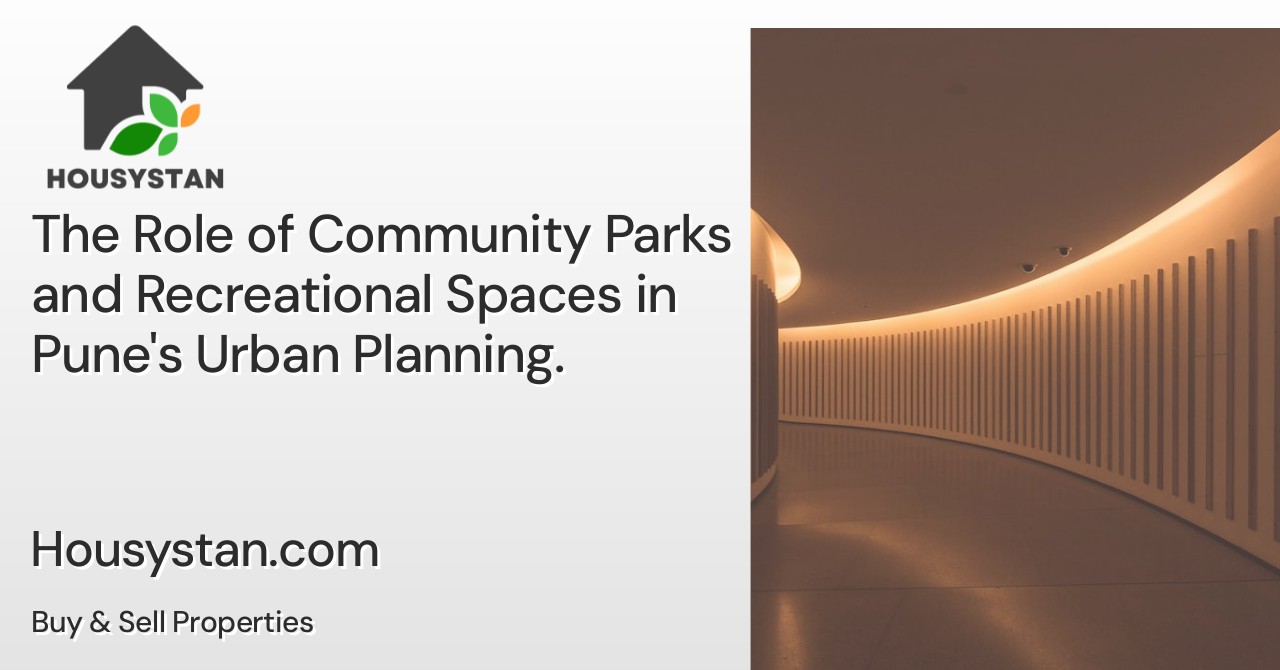The Role of Community Parks and Recreational Spaces in Pune's Urban Planning
Read latest blogs and articles from Housystan

The Information mentioned here was last updated on:
29/1/2026The Role of Community Parks and Recreational Spaces in Pune's Urban Planning
Introduction: The Green Pulse of Pune
Located in the heart of Maharashtra, Pune is rapidly evolving from a quintessential educational hub into a bustling urban center. As the city expands, urban planners and city officials are increasingly turning their attention to the role of community parks and recreational spaces. These green lungs are more than just open areas; they play a critical role in enhancing the quality of urban life. This article sheds light on why community parks and recreational spaces are essential for Pune's urban planning.
- Verified Tenants/Buyers
- Unlimited Property Listing
- Zero subscription/charges fee
Urbanization and the Need for Green Spaces
As cities grow, concrete landscapes often replace green pastures, leaving residents with fewer places to relax and unwind. Pune is no stranger to this trend. Rapid urbanization has led to urban congestion, increased pollution, and reduced public spaces. In this context, introducing and maintaining green spaces becomes crucial not just for aesthetic reasons but for the well-being of the city's residents.
Community parks provide a welcome respite from the urban hustle and bustle. They offer a sanctuary for people to retreat to, enjoying a slice of nature amidst the city chaos. These spaces are not merely about greenery; they foster social interactions, promote physical activity, and offer mental health benefits.
Health Benefits of Green Spaces in Urban Areas
Research shows that residents living near parks and recreational spaces tend to exercise more, which reduces the risk of chronic diseases. For Pune's urban dwellers, community parks represent an opportunity to engage in physical activities such as walking, jogging, yoga, and other outdoor sports.
Moreover, parks contribute significantly to mental health. They serve as stress relievers and mood enhancers, offering a natural setting that can help reduce anxiety and depression. For families, parks provide a safe space for children to play, which is crucial for their physical and social development.
Environmental Impact and Sustainability
Parks and recreational spaces are vital in mitigating the adverse effects of urbanization. They help improve air quality by absorbing pollutants and increasing oxygen levels. Green spaces also aid in cooling down urban heat islands, something Pune's residents particularly appreciate during the sizzling summer months.
With the increased global focus on sustainability, urban planners in Pune are incorporating eco-friendly practices in the design and maintenance of these spaces. Many parks now host rainwater harvesting systems, solar lighting, and native plant species that require less water and maintenance.
Social Cohesion and Community Development
Beyond their health and environmental benefits, community parks play a significant role in enhancing social cohesion. They act as communal hubs where people from diverse backgrounds can interact, fostering a sense of belonging and community pride.
These green spaces often host cultural events, yoga sessions, art workshops, and other community activities. For Pune, known for its rich cultural heritage, parks offer venues for traditional festivals and performances, helping preserve the city's cultural identity.
Challenges in Developing and Maintaining Parks
Despite the evident benefits, developing and maintaining parks in a rapidly urbanizing city like Pune comes with challenges. Land acquisition can be a significant hurdle due to high real estate prices and the shortage of available plots in urban areas.
Ongoing maintenance of these spaces also requires substantial investment and resources. This involves regular landscaping, safety measures, and ensuring the availability of amenities such as benches, walking paths, and restrooms. Fortunately, public-private partnerships are increasingly being leveraged to fund and manage these green spaces efficiently.
Innovative Approaches in Pune’s Urban Planning
Pune’s city planners are exploring innovative approaches to integrate more green spaces into urban landscapes. Vertical gardens, rooftop gardens, and micro-parks in densely populated areas are creative solutions that maximize limited space while providing greenery.
There's also a growing interest in multifunctional green spaces that serve various purposes. These spaces can double as stormwater management systems or act as wildlife corridors, enhancing biodiversity amidst the cityscape.
The Role of Technology in Park Management
Technology is playing a pivotal role in the management of Pune's parks. Smart technologies are being integrated into park management systems to enhance visitor experience and operational efficiency. Sensors and IoT devices are used for monitoring soil moisture, tracking park usage, and managing lighting systems.
Mobile applications now allow residents to locate parks, view amenities, and receive updates on events and maintenance schedules. Technology also facilitates community feedback, enabling residents to report issues or suggest improvements directly to city officials.
Community Involvement and Stewardship
Active community participation is vital for the success of parks and recreational spaces. Citizen engagement ensures these spaces are well-maintained and aligned with the needs of the residents. In Pune, local NGOs, resident associations, and volunteers play an active role in the upkeep and beautification of neighborhood parks.
Community gardening projects, tree planting drives, and clean-up campaigns encourage active neighborhood involvement and instill a sense of ownership among residents. This grassroots approach not only strengthens community bonds but also promotes a culture of environmental stewardship.
Conclusion: Envisioning a Greener Pune
As Pune continues to grow, the importance of integrating community parks and recreational spaces into urban planning cannot be overstated. While challenges exist, proactive planning and community engagement can pave the way for a greener, healthier, and more sustainable urban environment. Whether it's a serene morning walk, a weekend picnic with family, or a community festival, Pune's parks are indispensable to the city's soul and spirit.